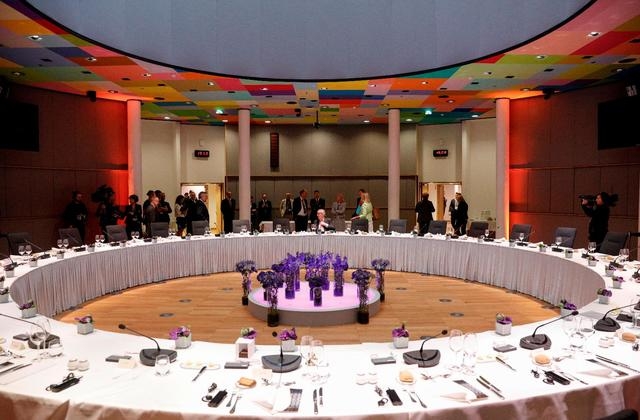EU leaders struggle to agree on candidates for top jobs

European Union leaders struggled deep into Monday to narrow down a list of candidates for key posts at the helm of the 28-nation bloc amid deep divisions over how to best balance political, geographic and gender considerations.
With the selection process bogged down for the second EU summit meeting in a row, the leaders were still considering Dutch socialist Frans Timmermans to replace Christian Democrat Jean-Claude Juncker as president of the EU's powerful executive arm, the European Commission.
The move caused deep division within the European People's Party-Christian Democrat group as it would surrender the key post to the rival Socialists & Democrats bloc despite EPP remaining the biggest group in the EU following last month's election.
Bulgarian Prime Minister Boyko Borissov, an EPP stalwart, posted a video on his verified Facebook account of a discussion with Timmermans in which Borissov said the Dutchman should get the Commission job while the less coveted parliament presidency should go to EPP candidate Manfred Weber.
But Irish Prime Minister Leo Varadkar insisted that the "vast majority of the EPP prime ministers don't believe we should give up the presidency of the Commission quite so easily, without a fight."
Another key appointment was to replace Donald Tusk as head of the agenda-setting European Council.
The task was never going to be easy. The appointments must take into account political affiliation, geography — balancing east and west, north and south — population size and gender. The leaders of EU institutions are supposed to impartially represent the interests of all member nations on the global stage and in Brussels.
Some leaders discussed the roster of upcoming vacancies, which also include the EU's top diplomat, the president of the European Parliament and the chief of the European Central Bank, on the sidelines of the Group of 20 summit in Japan that concluded Saturday.
Tusk and Juncker's mandates expire at the end of October. Asked about likely candidates for Juncker's job at the European Commission, Dutch Prime Minister Mark Rutte said Sunday, "That's a moving picture."
"You think that one candidate or another possibly has the best chance and it keeps shifting," he added.
French President Emmanuel Macron called for a "spirit of compromise and above all ambition" as the leaders look to name what he described as "the new Team Europe."
"There should be two men and two women" candidates for four of the five posts up for grabs in coming weeks, he said.
Macron, like Rutte, declined to say who he was backing.
The discussions about who should take over at the EU's helm for the next five years and beyond could go well into the night, if not through it, Tusk warned.
He wants nominations to be wrapped up soon, seeking to prevent further erosion of public confidence in the EU amid Brexit uncertainty and intra-bloc divisions over managing migration.
There was hope at the previous summit on June 20-21 that more time would bring clarity on who should replace Juncker as commission president. German Chancellor Angela Merkel backs German conservative Manfred Weber, whose center-right European People's Party is the largest political group in the European Parliament but lost seats in the EU elections in May.
Macron has suggested Weber lacks the political and government experience for such a high-profile role. Weber could still be considered for the head of the European Parliament which is the EU's only elected institution.
Merkel said there was still a good possibility for Weber and the center-left top candidate, Dutch politician Frans Timmermans of the European Socialist and Democrats group, to be among the winners of the top positions, but other leaders from the same political family disagreed.
The European People's Party, which is made up of Christian Democrats, and the S&D are the two biggest political groups in the EU, but both lost seats in May's polls, where far-right and populist parties, pro-business liberals and the Greens made gains.
EU leaders want to fill the positions soon because the European Parliament is set to pick a new president next Wednesday.
Under EU rules, member countries choose who will run the Commission, replacing Juncker. The parliament must endorse that choice. But the assembly has insisted that only the lead candidates from parties that ran in last month's elections should be eligible for the post.
The commission proposes and enforces EU laws on policies ranging from ranging from the massive single market to agriculture spending, from competition issues to immigration.
The job responsibilities are huge: Tusk and Juncker negotiate with the likes of U.S. President Donald Trump or Chinese leader Xi Jinping, while the head of the ECB can set monetary policy for the 19 nations that use the shared euro currency.
The outgoing group of EU officials was lopsidedly Italian, with Antonio Tajani holding the parliament top post, Mario Draghi head of the ECB and Federica Mogherini the EU foreign policy chief.
Top candidates include current prime ministers Stefan Lofven of Sweden and Andrej Plenkovic of Croatia. Others mentioned include Brexit negotiator Michel Barnier of France, Greens leader Ska Keller of Germany, Lithuanian President Dalia Grybauskaite and Margrethe Vestager, the EU's competition chief since 2014.
